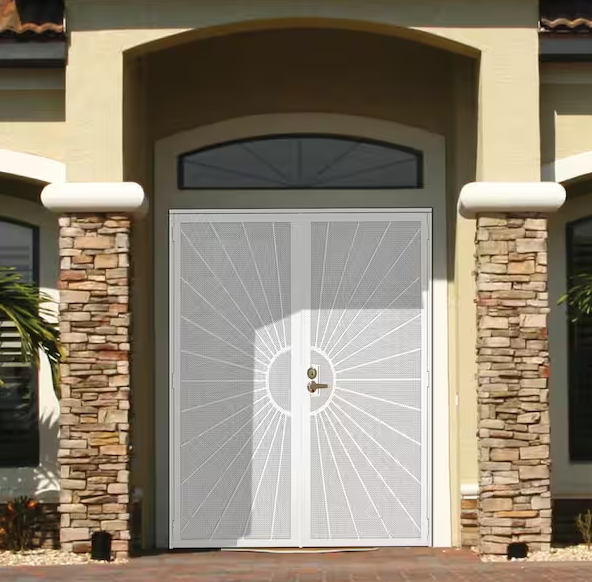Perforated metal screen doors are widely used for ventilation, light control, and protection in both industrial and architectural applications. From residential entryways to factory enclosures, these doors combine aesthetics and functionality. However, like any building material, they can encounter certain problems over time. This article explores the most common issues faced with perforated metal screen doors and how they can be addressed for improved performance and durability.
Huijin Metal Meshes, as a reliable manufacturer in the metal mesh industry, provides a good reference point to understand these common challenges.

Why Does Corrosion Occur in Perforated Metal Screen Doors?
One of the most frequent problems with perforated metal screen doors is corrosion, especially when used in humid or outdoor environments. Metals such as steel or iron, if not properly coated, are susceptible to rust due to oxygen and moisture exposure.
Corrosion weakens the door’s structure, reduces its lifespan, and diminishes its visual appeal. Even stainless steel can corrode slightly in coastal areas with high salinity. The key to preventing corrosion is proper material selection—using galvanized or powder-coated metals—and routine maintenance, such as cleaning the surface to remove dust and salt residues.
What Causes Bending or Deformation in Perforated Metal Screen Doors?
Perforated metal screen doors are often subjected to mechanical stress, frequent opening and closing, or even accidental impact. Thin panels may bend or warp under pressure, particularly when large perforations reduce the metal’s rigidity.
Temperature variations can also lead to expansion and contraction, gradually deforming the frame. To reduce this risk, the use of thicker gauge metal and high-precision installation is recommended. Reinforcing frames and hinges can further improve the structural integrity of the door, making it more resistant to deformation.
Why Does Noise Occur When Operating a Perforated Metal Screen Door?
Rattling or squeaking sounds are another common complaint. These noises usually result from loose hinges, misalignment between the frame and door, or metal fatigue. In some cases, thermal expansion causes metal parts to rub against each other.
To eliminate these issues, routine lubrication of hinges and regular tightening of screws should be performed. High-quality hardware and accurate fitting also help minimize vibration and ensure smooth operation.
How Does Dust and Debris Affect Perforated Metal Screen Doors?
While the perforated design allows airflow, it also lets in dust and debris. Over time, this buildup can block ventilation holes and reduce the door’s performance. In industrial environments, fine dust particles can even cause abrasion on the metal surface.
Regular cleaning with a mild detergent and soft brush can help maintain air permeability and visual clarity. Avoid using strong acids or abrasive materials that could damage protective coatings. Huijin Metal Meshes emphasizes surface treatment techniques that make cleaning and maintenance easier, extending the service life of the metal mesh.
What Problems Arise from Improper Installation of Perforated Metal Screen Doors?
Even the highest-quality perforated metal screen doors can underperform if installed incorrectly. Common installation problems include uneven alignment, insufficient fastening, or mismatched frame sizes. These issues can lead to air leakage, vibration, or difficulty in closing the door.
To prevent such problems, installation should always follow manufacturer guidelines. Using professional tools and checking level alignment are crucial steps. A precise installation ensures optimal fit and minimizes mechanical stress, extending the product’s usability.
Why Does the Finish or Coating Deteriorate Over Time?
Paint or powder coatings protect the underlying metal from oxidation, but exposure to UV light, moisture, and physical wear can gradually cause fading or peeling. Once the coating deteriorates, corrosion risk increases significantly.
To maintain long-lasting protection, users should reapply coatings when early signs of wear appear. Opting for UV-resistant powder coatings provides better durability and retains color for years, especially for outdoor applications.
What Are the Safety and Security Concerns with Perforated Metal Screen Doors?
In some cases, users report concerns about the strength and security of perforated metal screen doors, especially when the perforation size is large. While the open area improves ventilation, it may compromise resistance to forced entry.
Choosing the right balance between open area percentage and metal thickness is essential. Security applications should use smaller perforations and stronger materials like stainless steel or aluminum alloys to ensure both airflow and safety.
How Can Maintenance Extend the Lifespan of Perforated Metal Screen Doors?
Routine maintenance plays a vital role in preventing most common issues. Cleaning, lubrication, tightening loose components, and inspecting for cracks or corrosion are essential steps. Preventive maintenance schedules—especially in coastal or industrial regions—help reduce repair costs and extend the door’s operational life.
Additionally, regular inspection of hinges, locks, and frames ensures the door continues to perform effectively. With proper upkeep, a perforated metal screen door can remain functional and visually appealing for many years.
What Future Innovations Are Expected for Perforated Metal Screen Doors?
As material science advances, modern perforated metal screen doors are being designed with enhanced coatings, lightweight composites, and anti-corrosion alloys. Smart surface treatments and nano-coatings are emerging to improve durability and self-cleaning properties.
Manufacturers are also experimenting with energy-efficient designs and acoustic control features to meet the growing demand for sustainable architecture. These innovations ensure perforated metal screen doors will continue to evolve with the needs of both industrial and architectural sectors.
Conclusion
Perforated metal screen doors offer a blend of strength, ventilation, and visual appeal. Yet, issues like corrosion, deformation, noise, and installation errors can affect their performance. By choosing the right materials, ensuring proper installation, and maintaining the surface regularly, these problems can be minimized.
With its extensive experience in metal mesh production, Huijin Metal Meshes continues to serve as a valuable reference for understanding and improving the performance of perforated metal screen doors in various environments.




Comments